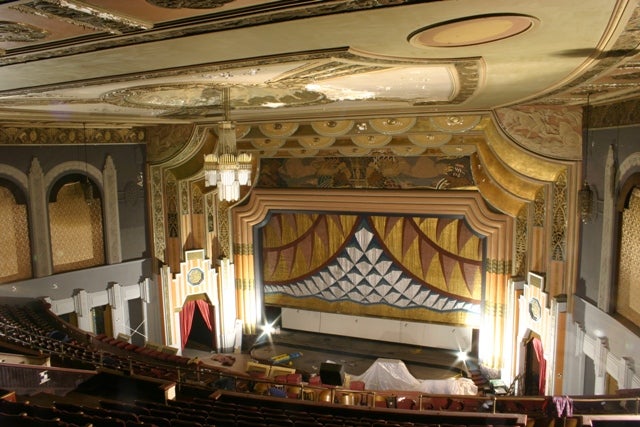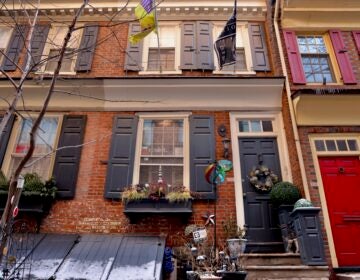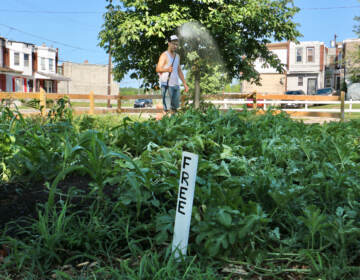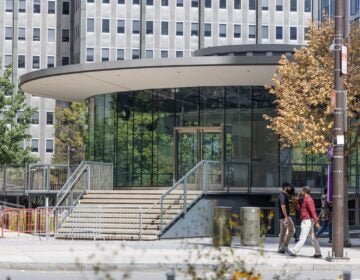Boyd Theatre gets historic nod

Boyd interior, courtesy Rob Bender
July 16
By Thomas J. Walsh
For PlanPhilly
The Boyd Theatre, the shuttered, Art Deco movie palace near Rittenhouse Square that has long been a concern for preservationists, is being recommended for placement on the city’s Register of Historic Places.
The Committee on Historic Designation, an advisory arm of the Philadelphia Historical Commission, voted unanimously Wednesday morning to recommend the designation of the theatre at 1908 Chestnut Street to the broader commission.
“The Boyd stands at the exciting intersection of two very powerful and innovative” early 20th Century movements – Art Deco architecture and the movie industry, said David Brownlee, a professor of historic architecture at the University of Pennsylvania and a former commission member. The coincidence of those two innovations makes saving the Boyd all the more important because of “its brief burning moment of intersection” just prior to the Depression in the 1930s, he said. Brownlee called the period “an inferno of change” for the arts — architecture and cinema not least among them.
No one at the 9 a.m. City Hall meeting, among the committee members or the several dozen members of the public, objected to the action.
The commission’s Jeff Cohen said that the nomination, submitted by the Preservation Alliance for Greater Philadelphia, was “very well presented” but needed work on the identification of specific photographs and more discussion of the building’s “atypical” Art Deco style. “I think we can do better,” Cohen said. “I think we can give a recommendation but amend and improve” the nomination.
Douglas Mooney, an archaeologist on the committee, said the nomination should be amended to include the Boyd’s “archaeological potential,” since a hotel and a private residence were on the site before the cinema was built in 1928.
Mooney’s desires, though, raised concerns from some committee members and onlookers. “I would ask you to be conservative” with regard to the possible archaeological ramifications when amending the nomination, urged John Gallery, executive director of the Preservation Alliance. The group is “not aware of any indications that there really is something there.”
The worry is that if the Historical Commission approves the recommendation in part due to reasons having to do with possible archaeological significance, it could scare away a buyer for the property. Even a developer with the theatre’s best interests at heart could be soured by the thought of an expensive refurbishment effort stalled while archaeologists methodically dig up what’s been buried for more than 80 years. Including archaeological aspects in the historical designation nomination could, in other words, defeat its purpose.
“These things are done in very real time,” agreed Harris Steinberg, executive director of Penn Praxis and another former commissioner. “Slowing the process down” right now to address that level of detail could jeopardize the protections sought, he said.
Mooney said that archaeological exploration is never used to cause demolition, and that preservation is a primary objective in his field of study, too. But, he wondered, if archaeological considerations are not included in the nomination proposal, would the commission have the authority to commence such a study if later it was discovered it was warranted? Recent work on President George Washington’s house on Independence Mall and findings at the site of the proposed SugarHouse casino on the Delaware River waterfront are proof that such considerations can yield treasures, he added.
The committee decided to put the archaeological question aside for the time being. Steinberg said the committee might consider convening a subcommittee for an additional level of scrutiny on the issue and create language that could navigate around any potential developer’s concerns.
The Historical Commission declined to award the Boyd historical status in 2002, when it was almost demolished before the current owner, Live Nation, purchased the 2,350-seat theater and its adjacent parking lot with the hopes of making it into a musical theater. But the company has nixed those plans and is trying to sell it.
In May, the National Trust for Historic Preservation named the Boyd one of the 11 Most Endangered Historic Places in the United States.
The city Historical Commission’s Register of Historic Places consists of more than 10,000 buildings, structures, sites, objects and districts designated as historic and worthy of preservation. It is distinct from the National Trust, above, and also from the National Register of Historic Places. The National Register is overseen in the commonwealth by the Bureau for Historic Preservation at the Pennsylvania Historical and Museum Commission in Harrisburg.
Contact the reporter at thomaswalsh1@gmail.com
Previous coverage:
June 18: Planning Commission to further study preservation bill; http://www.planphilly.com/node/3348
May 29: Nutter wants the Boyd preserved; http://www.planphilly.com/node/3212
May 22: Vocal turnout for Boyd Theatre rally; http://www.planphilly.com/node/3183
Inga Saffron column (May 22, 2008): http://www.philly.com/philly/news/homepage/19167599.html
WHYY is your source for fact-based, in-depth journalism and information. As a nonprofit organization, we rely on financial support from readers like you. Please give today.






